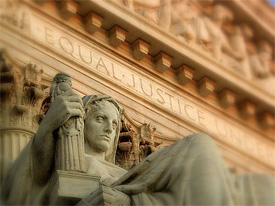 The Patient Protection and Affordable Care Act (ACA), otherwise popularly known as “Obamacare” had a bit of a rough go of it this week at the Supreme Court. Jeff Toobin called it a train wreck (later upgraded to plane wreck). Kevin Drum termed it a “debacle” and Adam Serwer a “Disaster“.
The Patient Protection and Affordable Care Act (ACA), otherwise popularly known as “Obamacare” had a bit of a rough go of it this week at the Supreme Court. Jeff Toobin called it a train wreck (later upgraded to plane wreck). Kevin Drum termed it a “debacle” and Adam Serwer a “Disaster“.
Was it really that bad? Considering how supremely confident, bordering on arrogant, the Obama Administration, and many of the ACA’s plethora of healthcare “specialists”, had been going into this week’s arguments, yes, it really was that bad. Monday’s argument on the applicability of the tax Anti-Injunction Act (AIJA) went smoothly, and as expected, with the justices appearing to scorn the argument and exhibit a preference to decide the main part of the case on the merits. But then came Tuesday and Wednesday.
Does that mean the ACA is sunk? Not necessarily; Dahlia Lithwick at Slate and Adam Bonin at Daily Kos sifted through the debris and found at least a couple of nuggets to latch onto for hope. But, I will be honest, after reading transcripts and listening to most all of the audio, there is no question but that the individual mandate, and quite possible the entire law, is in a seriously precarious lurch.
Unlike most of my colleagues, I am not particularly surprised. Indeed, in my argument preview piece, I tried to convey how the challenger’s arguments were far more cognizable than they were being given credit for. The simple fact is the Commerce Clause power claimed by Congress in enacting the individual mandate truly is immense in scope, – every man, woman and child in the United States – and nature – compelled purchase of a product from private corporate interests. Despite all the clucking and tut tutting, there really never has been anything like it before. The Supreme Court Justices thought so too.
I have no idea what kind of blindered hubris led those on the left to believe the Roberts Court was going to be so welcoming to their arguments, and to be as dismissive of the challengers’ arguments, as was the case. Yes, cases such as Raich and Wickard established Congress could regulate interstate commerce and Morrison and Lopez established there were limits to said power. But, no, none of them directly, much less conclusively, established this kind of breathtaking power grant as kosher against every individual in the country.
Despite the grumbling of so many commentators that the law was clear cut, and definitively established in favor of the mandate, it wasn’t, and isn’t. And I was not the only one on the left who found the challenging arguments serious, Professor Jonathan Turley did as well (see here and here).
There is no particular need to rehash all the different arguments, and iterations of them by the scores of commentators (not to mention the participants in the case, of course), that has already been done elsewhere, actually everywhere, ad nauseum. There is one area I do want to touch on, at least briefly, though. Limitations of power. This is an important concept in Commerce Clause law, which is why I tried to focus on it in the argument preview article.
Simply put, the the question is, if the federal government can, via the Article I Congressional authority, stretch the reach of the Commerce Clause to every individual in the US, willing or not, as they did in the “ACA Individual Mandate” is there any power over the individual and/or the states, that is still out of bounds? Are there any limitations left on the ability of the federal to consume individual determination? What the Supreme Court looks for in such an inquiry are “limiting principles” that could constrain the power in the future. Another term of art used in the law is, is there any way to “cabin”, i.e. constrain, the power?
In addition to the preview post, I also asked colleagues on Twitter (here and here) to describe proper concepts that would accomplish the goal. For over a day, until the reality that – gasp – this was also the concern of the justices, there was literally no discernible response. Once that reality, forced by the Court, set in however, attempts came fast and furious. Nearly all were rationalizations for why the ACA/mandate was necessary and/or desirable, but were not actual limiting principles.
It was a bit of a trick question, because the best lawyers in the government and amici did not do so hot in that regard either. Out of all I have seen, the one that struck me as fairly easily the best was propounded by Professor Jack Balkin:
The Moral Hazard/Adverse Selection Principle
Congress can regulate activities that substantially affect commerce. Under the necesary and proper clause, Congress can require people to engage in commerce when necessary to prevent problems of moral hazard or adverse selection created by its regulation of commerce. But if there is no problem of moral hazard or adverse selection, Congress cannot compel commerce. Courts can choose different standards of review to decide how much they want to defer to Congress’s conclusion.
Nice, tight and definable. Not bad. Still leaves a lot of ground – likely far too much – open to suit the apparent Supreme Court majority forming. So, when you read, here or otherwise, discussion about “limiting principles” or “cabining”, this is what is being contemplated.
As usual, Justice Anthony Kennedy is the critical swing. And Kennedy’s general understanding (and consideration here) of liberty is instructive. The following lays it out quite well, using both quotes from last Tuesday’s oral argument and background, and comes via Adam Liptak at the New York Times:
Paul D. Clement, representing 26 states challenging the law, had a comeback. “I would respectfully suggest,” he said, “that it’s a very funny conception of liberty that forces somebody to purchase an insurance policy whether they want it or not.”
…..
Justices tend to ask more questions of the lawyers whose positions they oppose, and Justice Kennedy posed six questions to Mr. Verrilli and just three to the two lawyers challenging the law.
The questions to Mr. Verrilli were, moreover, mostly easy to read. They were crisp expressions of discomfort with the administration’s arguments.
“Can you create commerce in order to regulate it?” Justice Kennedy asked.
“This is a step beyond what our cases have allowed, the affirmative duty to act to go into commerce” he said. “If that is so, do you not have a heavy burden of justification?”
“Can you identify for us some limits on the commerce clause?” he asked.
Those questions fit neatly within one strain of Justice Kennedy’s understanding of liberty, one he discussed at length last year in an opinion for a unanimous court.
Limiting federal power, he wrote, “protects the liberty of all persons within a state by ensuring that laws enacted in excess of delegated governmental power cannot direct or control their actions. By denying any one government complete jurisdiction over all the concerns of public life, federalism protects the liberty of the individual from arbitrary power. When government acts in excess of its lawful powers, that liberty is at stake.”
There is a Constitutional desire, and instruction to, colloquially, have limitation on federal power and to reserve rights to states and liberties to individuals. The Supreme Court, and Justice Kennedy (and to a lesser extent Chief Justice Roberts), in the ACA arguments was grappling with these concepts. How they find them, and decide them, will determine the outcome on the mandate.
One way or another, the case on the mandate will be decided. In the preview post before oral arguments began, I predicted either a 6-3 decision to uphold the constitutionality of the mandate or a 5-4 decision against it. The odds on the latter have soared. At this point, I would rate the odds at 50:50 either way. But, sometime – likely near the end of June – there will be a decision and the victory dance by the winning side and caterwauling and demeaning of the “politicized Court” by the losers will commence. That pattern will play out regardless of which party wins, and which party loses.
As described in both the instant post, and the preview piece, the arguments are indeed contentious, but they are also quite real. There are fundamental differences, over fundamental interpretations of fundamental rights. And, despite the often PT Barnum like contentions of the ACA cheer squad on the left, and from the Obama Administration, the nature and reach of the mandate truly is unprecedented and never was “unquestionably constitutional” as so many claimed. The left created their own self sustaining echo chamber and convinced themselves a truly controversial mandate was self fulfilling and golden.
The arguments against the mandate by the challengers are not wrong or silly simply because made by the “other side”. There IS merit to their concern, even if you ultimately believe the mandate should be upheld. Which has made it distressing, to be kind, to see the efforts of many of my colleagues on the left to demonize and degrade the questions and apparent inclination by the conservative bloc of the Roberts Court during oral arguments.
It took Jonathan Chait at New York less than a day after the fateful oral arguments to start salting the thought the court was somehow illegitimate:
The spectacle before the Supreme Court this week is Republican justices seizing the chance to overturn the decisions of democratically-elected bodies. At times the deliberations of the Republican justices are impossible to distinguish from the deliberations of Republican senators.
Chait’s fellow dedicated ACA supporter, Jonathan Cohn at The New Republic quickly weighed in with his hyperbolic joinder:
Before this week, the well-being of tens of millions of Americans was at stake in the lawsuits challenging the Affordable Care Act.
Now something else is at stake, too: The legitimacy of the Supreme Court.
Even Dahlia Lithwick and Professor Richard Hasen, both of whom I respect somewhere beyond immensely, in separate articles at Slate, joined the chorus of casting stones of Court legitimacy degradation.
Please, folks, just stop. The question on the mandate is legitimate, and the other side believes their position every bit as much as you do yours. While there is certainly case precedent in the general area, there is just as certainly none directly on point with the way the “commerce” in this mandate is framed and “regulated”.
The Supreme Court is inherently a political body, at least in that its Justices are politically appointed. Presidential candidates of both stripes campaign on the type of Justices they would appoint if given the opportunity. Further, the Supreme Court is the final arbiter of the most controversial questions, that habitually involve mixed issues of politics and law, and has been ever since Marbury v. Madison.
Charges against the legitimacy of the Supremes have also been extant since the time of Marbury v. Madison, and continue into the modern set of decades with cries by the right against the Warren Court, to the bookend cries by the left against the Burger and Rehnquist Courts. The Supreme Court survived all those, and is still ticking after Bush v. Gore and Citizen’s United. It will survive this too.
And, as David Bernstein pointed out, why in the world would the left undermine the Court’s legitimacy when it is one Presidential appointment away from taking over the ideological majority? No kidding. I respectfully urge my colleagues on the left to step back, take a breath of air, and rethink the idea of degrading the Court over this case.
Those, however, are not the only reasons Democrats and the left should take a step back and rethink how they are reacting to the SCOTUS consideration of the ACA mandate. I pointed out in the ACA/SCOTUS preview post that progressives and conservatives were both, strangely, arguing contrary to type and ideology on the mandate. In a really bright piece of counterintuitive and intelligent thought, Jon Walker points out just how true that was:
If Conservatives get their way and the Supreme Court strikes down the individual mandate to buy health insurance, it would be a real victory for them; but in the end, the last laugh may be with actual progressives. While in this case an individual mandate was used to expand health coverage, similar individual mandates are the cornerstone for corporatist plans to unravel the public social insurance systems created by the New Deal/Great Society.
The basic subsidies, exchanges and individual mandate design that defines the ACA are at the heart of many corporatists’ attempts to destroy/privatizes the programs progressives support the most.
There are are two main ways for the government to provide universal public goods. The first and normally best way is to have the government raise money through taxes and then use that money to directly provide the service to everyone. The other option is to create an individual mandate forcing everyone to buy the service from private corporations while having the government subsidize some of the cost. These needless middlemen mostly just increases costs for regular people and the government. This is why corporations love this setup and push hard for it.
….
If the Supreme Court rules against this individual mandate in a way that basically makes it legally impossible to replace most of our current public insurance systems with mandated private systems, that should be seen as a big silver lining for progressives.
Go read the entire piece by Jon Walker, as it contains specific instances and discussions that are important.
In closing, I would just like to say it is NOT the case that the conservatives are definitely right in their challenge to the individual mandate in Obamacare, but it is a lot closer case than liberals make out, and liberals are being blind to the potential downside of it being upheld. All of these factors make the situation different than has been relentlessly painted; there are legitimate arguments on both sides and the Supreme Court will make a tough decision. Whatever it is, that will be their decision. It was a flawed law when it got to the Supremes, and they will still maintain legitimacy and respect when it leaves, regardless of how they sort the hash they were served.
[Article updated to reflect author Jon Walker for the last link, not David Dayen]







